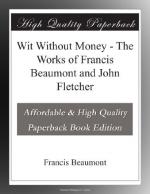|
This section contains 5,990 words (approx. 20 pages at 300 words per page) |

|
SOURCE: "The Casuistry of Innocence in A King and No King and Its Implications for Tragicomedy," in English Literary Renaissance, Vol. 8, No. 3, Autumn, 1978, pp. 312-28.
In the following essay, Woodson counters previous critical estimations of A King and No King, arguing that the play presents a "morally coherent dramatic sequence. " Beaumont and Fletcher's drama, he maintains, presents an ironic critique of Protestant beliefs regarding the "paradox of innocent sinners."
While Beaumont and Fletcher's A King and No King (1611) is generally recognized as a landmark in the development of Jacobean tragicomedy, it is also true that the play has perplexed virtually all its commentators beginning with Thomas Rymer [in The Tragedies of the Last Age Considered, 1692]. Written only a short time after the authors' Philaster (c. 1609), A King and No King clearly abandons the meandering romance structure of the earlier tragicomedy. Yet while the presence of a new dramatic...
|
This section contains 5,990 words (approx. 20 pages at 300 words per page) |

|


